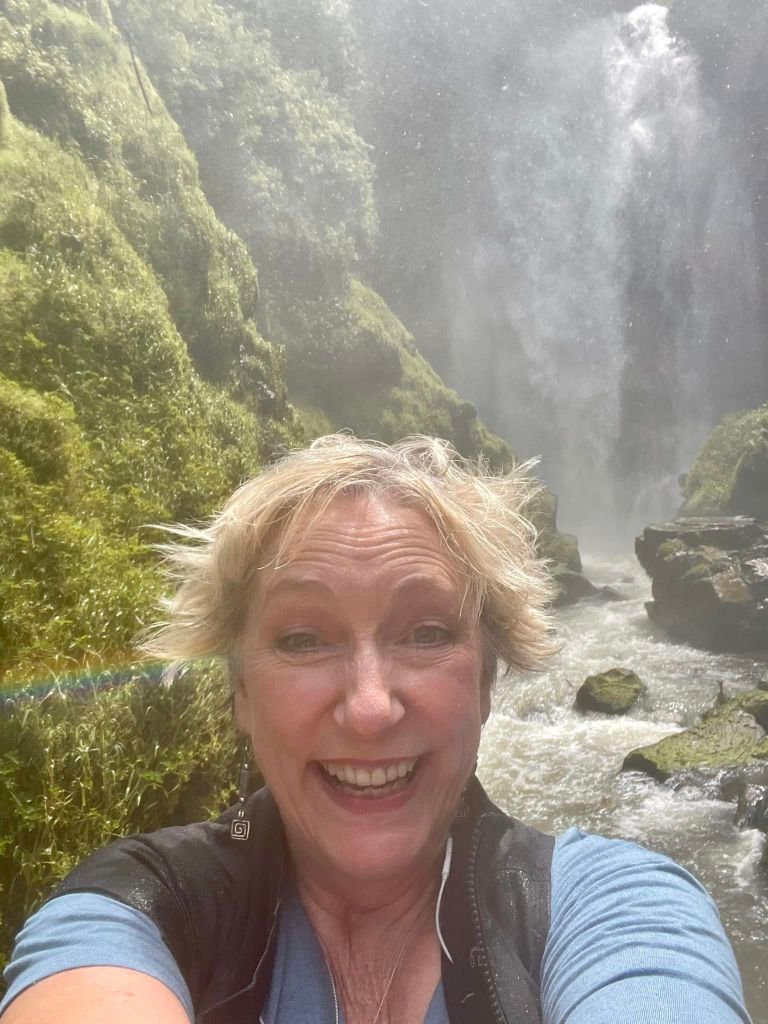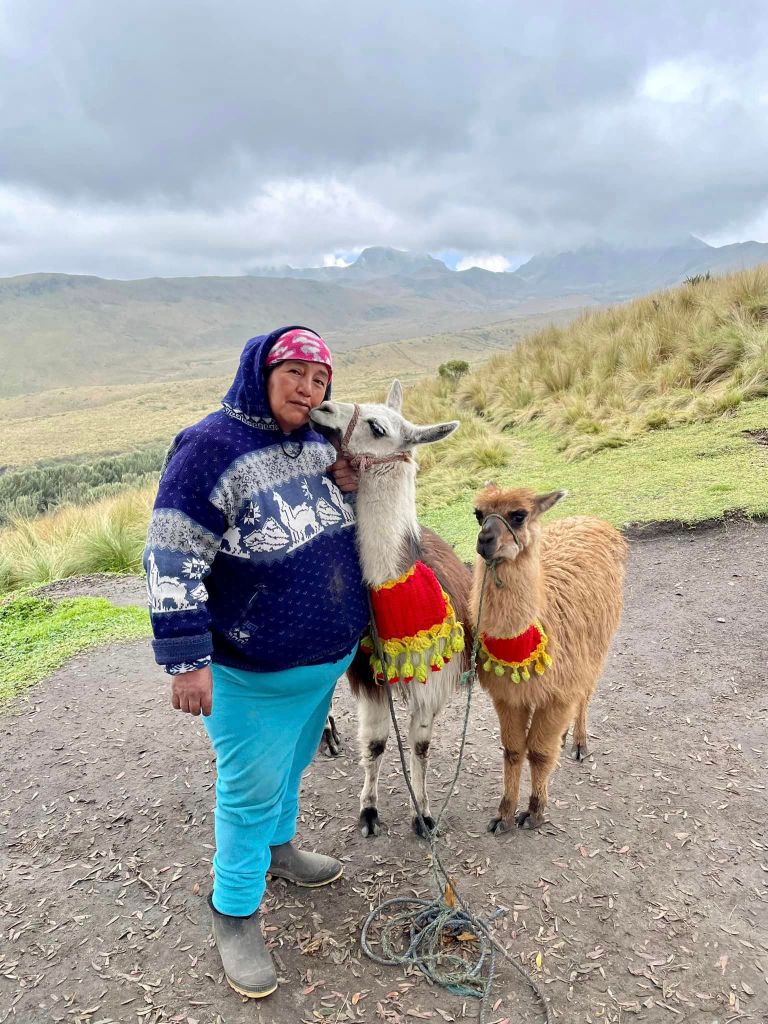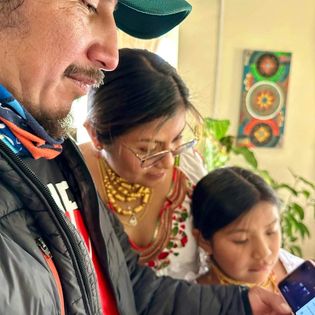On my first visit to Mexico as an adult, I ordered a quesadilla without soap instead of without ham (sin jabón instead of sin jamón). Then, to express my mortification, I told the waiter I was so pregnant instead of so embarrassed (estoy tan embarazada instead of estoy tan avergonzada). Learning another language requires frequent self-humiliation.
You would think my Spanish would be better after thirty years. Sadly, it’s not. Since I’ve been in Ecuador, I have continued to perplex the locals with my linguistic blunders. Not long after moving here, I excitedly exclaimed to my taxi driver that I had just received a wonderful mensaje (message) instead of a wonderful masaje (massage). He thought I was receiving messages from God like a saint or something. After getting a haircut and color, I pointed to my head and asked the same poor taxi driver, “How do you like my horse (caballo)?” instead of hair (cabello). I told another taxi driver that I was fine sitting in the back seat because I have short rocks (piedras) instead of legs (piernas). And those are just the incorrect interchanges I’m aware of. Who knows what other gaffes I’ve made without noticing. I try to smile a lot to offset anything incredibly offensive I may have said. So people just think I’m simple-minded but friendly.

Is Spanish Necessary for an Expat?
Some of my friends from the U.S. have asked me if they need to speak Spanish if they move to Ecuador. I say they should. Granted, I went to my first “gringo event” in Cotacachi yesterday, and I heard very little Spanish. I spoke in Spanish with a man from Colombia while I was waiting in line for the bathroom, but mostly I heard various accents of English mingling among the aromas from the chili cookoff while American Rock-n-Roll played in the background. Depending on where you choose to live, you can find pockets of expats speaking enough English that you could get by with just some phrases of Spanish. Cuenca, for example, has a huge expat community and lots of English, but I think it’s important to speak the local language, and that’s not just Spanish.
I live in an area with many indigenous people. The older generations speak mainly Kichwa. Children in the local schools learn Kichwa along with Spanish. Sadly, they are reluctant to speak it because some of the mestizo children ridicule their Kichwa accents and culture. But it’s a beautiful language, and I’m trying to learn it, too. Luckily, a woman from New York who lived among the indigenous for many years has written the only book in English to teach Kichwa: Gringos Learn Kichwa. She also has a wonderful Facebook group with videos to help you learn. Actually, Ecuadorians speak a total of 24 languages throughout the tiny country, but I’m going to start with just the two major ones spoken in my area, Spanish and Kichwa.

Why Is Learning the Local Language Important?
First of all, learning the language of the people with whom you interact every single day shows respect. People from the U.S. notoriously demand that others speak English to them–even when they are visiting a country that doesn’t speak English. Many also demand that those living in the U.S. speak English in public, sometimes bullying strangers to speak English because they fear they may be the subject of a conversation they can’t understand. And I agree that immigrants in the U.S. should learn English. But as a former English professor, I frequently remind my pompous co-patriots that most people living in the United States speak terrible English with incorrect grammar. It’s a difficult language to learn. I recently saw a t-shirt that said, “Do you know what a foreign accent is? A sign of bravery.” So learning the local language expresses that you want to belong so badly that you are willing to try–even risking making a fool of yourself–to fit into your new culture. It doesn’t mean you will lose your mother tongue. Your first language reflects your culture, part of who you are.

And that leads me to the second reason to learn the local language. You will never fully understand the people with whom you live if you don’t learn their language. The Spanish I am learning in northern Ecuador is not the Castilian Spanish I studied as a minor in my undergraduate degree. Nor is it the Mexican Spanish I learned working in a Mexican restaurant in Dallas while finishing my bachelor’s degree. I’m learning to pronounce the ll in words like silla, pollo, llama with the zj sound of Kichwa words, for example, and not the y sound I learned in Castilian and Mexican Spanish. People have told me that I speak like a Mexican, which is lovely, but I want to sound like an Ecuadorian. Locals use different words, too, like frutilla for strawberry instead of fresa.
It’s difficult to describe, but speaking Spanish like an Ecuadorian changes how I feel. It’s transformative. I feel surprisingly even more tranquila than a Mexican. I feel softer, lighter. Perhaps it’s something like listening to a New Yorker talk as opposed to someone from Georgia. It’s a completely different vibe. One is “tougher” than the other. They both carry different attitudes. If you can do accents, try saying, “How yoo doin’?” like a New Yorker, and then try, “How y’all been gettin’ on?” Your entire demeanor and attitude will transform. That’s what I’m talking about. Learning the local language connects you to the people in a way that you will understand on a deep level. You become an integral part of the whole, not the fly in the ointment, so to speak.
And being part of the whole is important here, much more than in the U.S. A recent study showed that Ecuador is one of the most collectivistic cultures in the world, scoring an 8 compared to the U.S. score of 91, which makes the U.S. one of the most individualistic cultures in the world. This deep understanding of the value of community fuels my desire to keep trying to learn the language of the people I meet here, work with here, and love as fellow human beings. It’s my passion for their way of life that is the real communication. They feel it as respect. And they help me. And I will learn and grow as a Spanish/Kichwa speaker and as a soul.

Finally, learning another language helps your brain. Studies show it can help people focus, boost creativity, and even increase their brain size. Other studies indicate that learning a second language may postpone dementia and Alzheimer’s. While it may appear that learning to speak Ecuadorian Spanish and Kichwa actually muddles my brain, I am noticing an increase in creativity. Sometimes I don’t know the word for something, so I begin explaining the term in words I do know, emphasizing with hand gestures, vocal inflections, and facial expressions (I do have a background in theatre, after all). I have to think differently and frame thoughts from various perspectives. But I don’t think I’m exercising just my gray matter brain. We have three brains, and learning another language helps all of them: the cephalic (head) and enteric (gut) brains as well as the cardiac (heart) brain. When I can’t logically remember the word or verb tense I need, I rely on my other brain, my heart. As a Reiki Master Teacher, I understand energy quite well. I can communicate feelings through the electromagnetic field of my heart. I can perceive what people mean from their hearts even when I don’t understand the words they are saying. I can understand in my gut when someone means to harm me. I’m grateful that I have to shift into this mode of understanding more. I think we all need to embrace these forms of deeper communication, especially in these times of misinformation when words seem to mean nothing–or when words simply serve to inflame and divide.

Forcing myself into these strange conversations employing my head, heart, and gut has been the most challenging–and therefore, the best–part of becoming Karina Andina. No matter what stage of life you’re in, you have to push yourself outside of your comfort zone. For younger people, like my son who is only 24 years old, life requires stretching into some dark, unexplored area of adulthood every day. But for those of us who have already passed most of the trials of a career, overcome some of the losses of life, and managed to raise families and survive our parents’ failures–we can submit to the siren call of an easy retirement and hard-earned rest. The problem is that ease and rest suffocate your continued unfolding. You need some challenges in life to keep growing. Your challenge may not be moving to another country and learning another language, but there’s probably something that you would like to do–something a little bit scary, something that requires you to learn something new, something that demands that you transform some part of your being. I invite you to start your journey and engage in your own eccentric discourse.
4 responses to “Chapter Two: Strange Conversations”
Hello Karina Andina!! I love your heart felt writing!! I love the photo’s you share and your cat feels so content on the window seal! I love that you always include and direct us to other information & resources. Your writings inspire me, I feel so included and I love your humor – what you thought you said and what the translations were…so fun! I tried listening to the latest talk with Pam LeBlanc and so much wanted to hear everything but the music was so loud it over rode the conversation so I didn’t get very far :-(. Your happiness is contagious, thank you for your posts and inspiration. Many blessings, Wanda
LikeLike
Thank you so much, Wanda! I don’t know why that music is playing over our conversation. I will mention it to Pam and see if she can remove it somehow. I appreciate your comments and your taking the time to read my blog. Many blessings to you!
LikeLike
Hi Karen, YEAH, the music is gone. Getting ready to have lunch and looking forward to listening to your podcast now.
Thank you so much!! Wanda
LikeLiked by 1 person
Thank you!
LikeLike